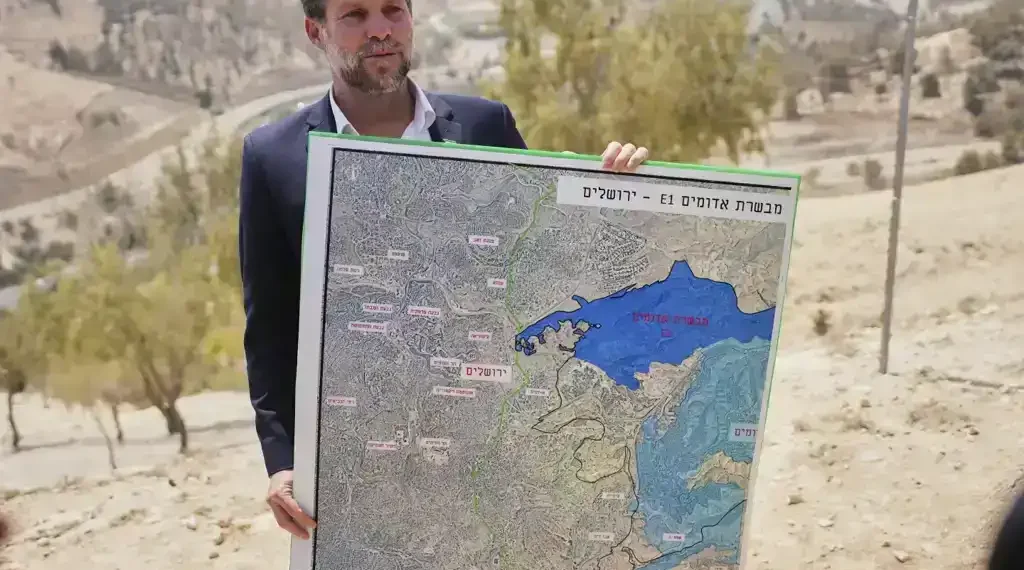Israel Finalizes Approval for West Bank Settlement Plan in E1 Region
Published Time: 08-20-2025, 15:45
Israel has granted final approval for a settlement project in the occupied West Bank that critics say could effectively divide the territory and undermine the possibility of a future Palestinian state. The move, centered on an area known as E1 east of Jerusalem, has drawn strong objections from Palestinians, human rights groups, and much of the international community.
E1 Project Approved After Two Decades of Debate
The settlement plan for E1, a stretch of land between Jerusalem and the large West Bank settlement of Maale Adumim, has been under consideration for more than 20 years. Previous Israeli governments had suspended the project in response to U.S. pressure and international opposition.
The proposal envisions around 3,500 new housing units. Israeli officials have suggested that infrastructure work could begin in the coming months, with construction possibly starting within a year.
Critics argue that building in E1 would sever the territorial continuity of the West Bank, leaving Palestinian cities like Ramallah in the north and Bethlehem in the south disconnected. This, they warn, would make it nearly impossible to establish a viable Palestinian state.
Government Justification and Political Context
Far-right Finance Minister Bezalel Smotrich, a former settler leader who has significant influence over settlement policy, framed the approval as a deliberate rejection of recent European initiatives to recognize a Palestinian state.
“The Palestinian state is being erased from the table not with slogans but with actions,” Smotrich said on Wednesday. “Every settlement, every neighborhood, every housing unit is another nail in the coffin of this dangerous idea.”
Prime Minister Benjamin Netanyahu has consistently rejected the two-state solution, pledging that Israel will maintain permanent control over the West Bank, annexed East Jerusalem, and Gaza. These territories, captured by Israel during the 1967 Middle East war, are claimed by Palestinians as the foundation of a future independent state.
International and Palestinian Reactions
The international community, including the United Nations and the European Union, has long regarded settlement construction in the West Bank as illegal under international law and a direct obstacle to peace. While formal statements regarding the latest approval are still forthcoming, diplomatic observers expect renewed criticism and possible calls for restraint.
Palestinian groups say the E1 project is a clear attempt to prevent statehood. Peace Now, an Israeli organization monitoring settlement expansion, issued a sharp rebuke.
“The settlement in E1 has no purpose other than to sabotage a political solution,” the group said in a statement. “While the consensus among our friends in the world is to strive for peace and a two-state solution, a government that long ago lost the people’s trust is undermining the national interest, and we are all paying the price.”
Impact on Palestinian Movement and Daily Life
The E1 area is seen as a crucial geographic corridor. Ramallah and Bethlehem, the two major Palestinian cities it would connect, are only about 22 kilometers (14 miles) apart. However, due to existing checkpoints and Israeli road systems, Palestinians must already take lengthy detours that often stretch travel into several hours.
A developed settlement in E1 would further limit movement and deepen reliance on Israeli-controlled routes, according to Palestinian officials and advocacy groups. Many fear it could lead to more displacement, tighter restrictions, and increased friction between settlers and local Palestinian communities.
Rising Tensions in the West Bank
The approval comes amid heightened instability across the West Bank. Reports of settler violence, evictions of Palestinian families, and near-daily Israeli military operations have surged in recent months. Palestinian attacks on Israelis have also occurred, contributing to a climate of fear and retaliation.
More than 700,000 Israelis now live in settlements in the West Bank and East Jerusalem. The growing settler population, combined with government-backed expansion, has intensified disputes over land, security, and the long-term prospects for peace.
Broader Settlement Expansion
In addition to the E1 approval, Israeli authorities also cleared the construction of 350 homes in the settlement of Ashael, located near Hebron. Smotrich hailed both decisions as evidence of what he described as a strategic commitment to expand Jewish communities across the West Bank.
Israel’s governing coalition, heavily influenced by religious and ultranationalist factions, has placed settlement growth at the center of its political agenda. Smotrich has publicly pledged to double the number of settlers in the West Bank, reinforcing the perception among critics that the government is entrenching permanent control over disputed land.
Outlook and Global Ramifications
The E1 project is expected to remain a major flashpoint in the Israeli-Palestinian conflict. If construction proceeds as planned, it will likely face legal challenges, international pressure, and possible protests on the ground.
Diplomats and analysts warn that the project could strain Israel’s relations with Western allies, many of whom continue to advocate for negotiations toward a two-state solution. For Palestinians, the settlement represents what they see as the closing of one of the last doors to statehood.
As global attention remains heavily focused on the war in Gaza, rights groups argue that developments in the West Bank risk being overshadowed. Yet the approval of E1 underscores how settlement expansion continues to shape the future of the conflict and the prospects for peace.
This article was rewritten by JournosNews.com based on verified reporting from trusted sources. The content has been independently reviewed, fact-checked, and edited for accuracy, neutrality, tone, and global readability in accordance with Google News and AdSense standards.
All opinions, quotes, or statements from contributors, experts, or sourced organizations do not necessarily reflect the views of JournosNews.com. JournosNews.com maintains full editorial independence from any external funders, sponsors, or organizations.
Stay informed with JournosNews.com — your trusted source for verified global reporting and in-depth analysis. Follow us on Google News, BlueSky, and X for real-time updates.













